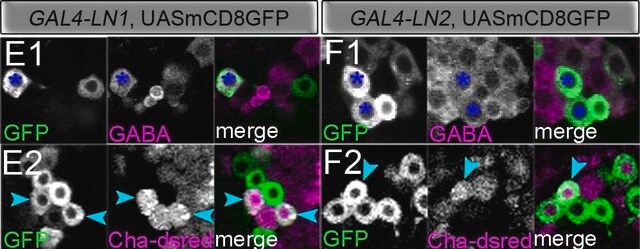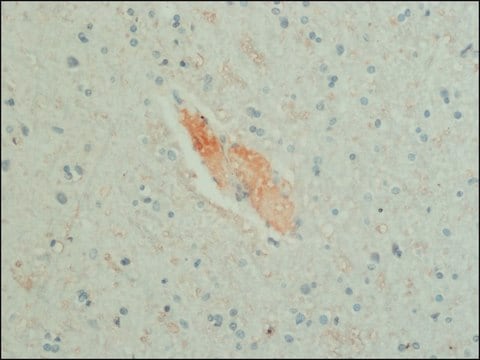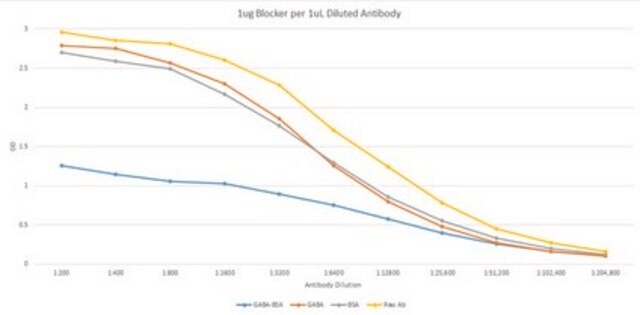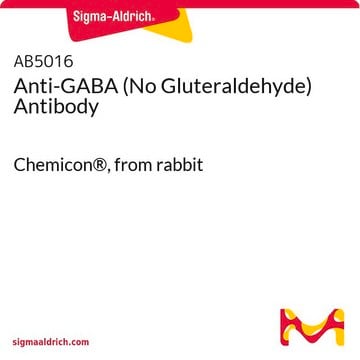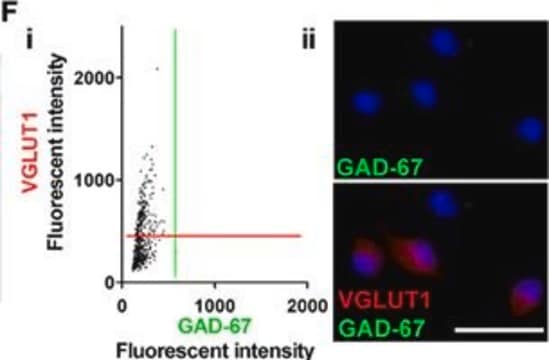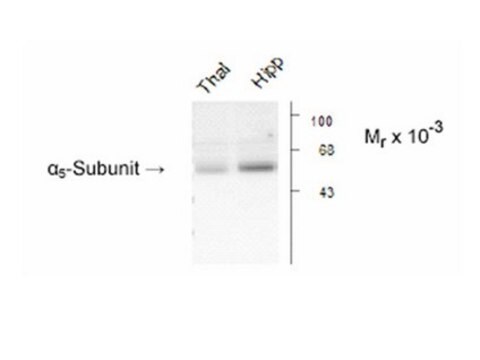추천 제품
생물학적 소스
guinea pig
Quality Level
항체 형태
serum
항체 생산 유형
primary antibodies
클론
polyclonal
종 반응성
rat
종 반응성(상동성에 의해 예측)
all
제조업체/상표
Chemicon®
기술
ELISA: suitable
immunohistochemistry: suitable (paraffin)
배송 상태
dry ice
타겟 번역 후 변형
unmodified
유전자 정보
rat ... Gabra1(29705)
일반 설명
GABA (gamma-aminobutyric acid) is the major inhibitory neurotransmitter in the central nervous system that inhibits the generation of the action potential of the neuron. It is involved in the pathogenesis of certain neurological and psychiatric disorders. GABA is produced from glutamic acid in a reaction catalyzed by glutamic acid decarboxylase. In this reaction pyridoxal phosphate serves as a co-factor. GABA interacts with the GABAA and GABAB receptors, which are widely distributed throughout the nervous system and in a variety of cell types. They differ in their pharmacological, electrophysiological, and biochemical properties. GABAA-receptor complex mediates an increase in membrane conductance with an equilibrium potential near the resting level of −70 mV. This conductance increase often is accompanied by a membrane hyperpolarization, which later results in a reduction in the probability of action potential initiation. The reduction in membrane resistance is accomplished by the GABA-dependent facilitation of Cl− ion influx. GABAB receptors are coupled indirectly to K+ channels. When activated, GABAB receptors reduce Calcium ion conductance and inhibit cAMP production via intracellular mechanisms mediated by G-proteins. GABAB receptors are known to mediate both postsynaptic and presynaptic inhibition.
특이성
GABA is a neurotransmitter synthesized in all species, and is therefore expected to react to all species.
Recognizes GABA. Staining was blocked by preabsorbing with 100 μM GABA conjugated to glutaraldehyde. 500 μM of similar conjugations of glutamic acid, glutamate and taurine failed to block staining.
면역원
BSA-conjugated GABA-Glutaraldehyde
애플리케이션
Immunohistochemistry Analysis: A 1:500 dilution from a representative lot detected GABA in rat brain tissue.
ELISA Analysis: A representative lot from an independent laboratory detected GABA in a competitive ELISA.
Immunohistochemistry Protocol:
Tissues fixed with 4% paraformaldehyde and 0-0.5% glutaraldehyde gives good results. Glutaraldehyde is required for antibody reactivity.
1) Tissue is fixed with 4% paraformaldehyde, 0-0.5% glutaraldehyde, 0.5% potassium dichromate in 0.1M phosphate buffer at pH 6.5.
2) Tissue is post-fixed overnight, vibratome sectioned in 50 mm and incubated in 0.05M Tris buffer, pH 6.5 for three hours.
3) Sections are incubated for 18-24 hours in AB175 diluted in PBS containing 0.1% sodium azide, 0.2% Triton X-100 and 1% normal goat serum.
4) Fluorescein conjugated antibody or ABC system may be used as the secondary reagent.
Note: Without colchicine pretreatment well-stained cell bodies are visible in the cerebral cortex, cerebrallar cortex, superior colliculus and some brainstem raphe. With colchicine pretreatment, additional cell body staining is present in the interpeduncular nucleus and the dorsal column nuclei.
ELISA Analysis: A representative lot from an independent laboratory detected GABA in a competitive ELISA.
Immunohistochemistry Protocol:
Tissues fixed with 4% paraformaldehyde and 0-0.5% glutaraldehyde gives good results. Glutaraldehyde is required for antibody reactivity.
1) Tissue is fixed with 4% paraformaldehyde, 0-0.5% glutaraldehyde, 0.5% potassium dichromate in 0.1M phosphate buffer at pH 6.5.
2) Tissue is post-fixed overnight, vibratome sectioned in 50 mm and incubated in 0.05M Tris buffer, pH 6.5 for three hours.
3) Sections are incubated for 18-24 hours in AB175 diluted in PBS containing 0.1% sodium azide, 0.2% Triton X-100 and 1% normal goat serum.
4) Fluorescein conjugated antibody or ABC system may be used as the secondary reagent.
Note: Without colchicine pretreatment well-stained cell bodies are visible in the cerebral cortex, cerebrallar cortex, superior colliculus and some brainstem raphe. With colchicine pretreatment, additional cell body staining is present in the interpeduncular nucleus and the dorsal column nuclei.
Research Category
Neuroscience
Neuroscience
Research Sub Category
Neurotransmitters & Receptors
Neurotransmitters & Receptors
This Anti-GABA Antibody is validated for use in Immunohistochemistry (Paraffin) and Enzyme Immunoassay (ELISA) for the detection of GABA.
품질
Evaluated by Immunohistochemistry in rat brain tissue.
Immunohistochemistry Analysis: A 1:500 dilution of this antibody detected GABA in rat brain tissue.
Immunohistochemistry Analysis: A 1:500 dilution of this antibody detected GABA in rat brain tissue.
물리적 형태
Depleted serum
Guinea Pig polyclonal BSA-depleted antiserum with 0.05% sodium azide.
저장 및 안정성
Stable for 1 year at -20°C from date of receipt.
Handling Recommendations: Upon receipt and prior to removing the cap, centrifuge the vial and gently mix the solution. Aliquot into microcentrifuge tubes and store at -20°C. Avoid repeated freeze/thaw cycles, which may damage IgG and affect product performance.
Handling Recommendations: Upon receipt and prior to removing the cap, centrifuge the vial and gently mix the solution. Aliquot into microcentrifuge tubes and store at -20°C. Avoid repeated freeze/thaw cycles, which may damage IgG and affect product performance.
분석 메모
Control
Rat Brain tissue
Rat Brain tissue
기타 정보
Concentration: Variable
법적 정보
CHEMICON is a registered trademark of Merck KGaA, Darmstadt, Germany
면책조항
Unless otherwise stated in our catalog or other company documentation accompanying the product(s), our products are intended for research use only and are not to be used for any other purpose, which includes but is not limited to, unauthorized commercial uses, in vitro diagnostic uses, ex vivo or in vivo therapeutic uses or any type of consumption or application to humans or animals.
적합한 제품을 찾을 수 없으신가요?
당사의 제품 선택기 도구.을(를) 시도해 보세요.
Storage Class Code
12 - Non Combustible Liquids
WGK
WGK 1
Flash Point (°F)
Not applicable
Flash Point (°C)
Not applicable
시험 성적서(COA)
제품의 로트/배치 번호를 입력하여 시험 성적서(COA)을 검색하십시오. 로트 및 배치 번호는 제품 라벨에 있는 ‘로트’ 또는 ‘배치’라는 용어 뒤에서 찾을 수 있습니다.
Ji-Jie Pang et al.
Investigative ophthalmology & visual science, 52(7), 4886-4896 (2011-04-13)
To examine the specificity and reliability of a retrograde double-labeling technique that was recently established for identification of retinal ganglion cells (GCs) and to characterize the morphology of displaced (d)GCs (dGs). A mixture of the gap-junction-impermeable dye Lucifer yellow (LY)
Kristina D Micheva et al.
eNeuro, 5(5) (2018-11-09)
Numerous types of inhibitory neurons sculpt the performance of human neocortical circuits, with each type exhibiting a constellation of subcellular phenotypic features in support of its specialized functions. Axonal myelination has been absent among the characteristics used to distinguish inhibitory
NaHye Lee et al.
Experimental neurobiology, 27(5), 365-376 (2018-11-16)
Medium-chain fatty acids (MCFAs) are mostly generated from dietary triglycerides and can penetrate the blood-brain barrier. Astrocytes in the brain use MCFAs as an alternative energy source. In addition, MCFAs have various regulatory and signaling functions in astrocytes. However, it
Mei Chen et al.
PloS one, 8(4), e61381-e61381 (2013-05-03)
Previous studies have shown that CCL2/CX3CR1 deficient mice on C57BL/6N background (with rd8 mutation) have an early onset (6 weeks) of spontaneous retinal degeneration. In this study, we generated CCL2(-/-)CX3CR1(GFP/GFP) mice on the C57BL/6J background. Retinal degeneration was not detected
Response features of parvalbumin-expressing interneurons suggest precise roles for subtypes of inhibition in visual cortex.
Runyan, CA; Schummers, J; Van Wart, A; Kuhlman, SJ; Wilson, NR; Huang, ZJ; Sur, M
Neuron null
자사의 과학자팀은 생명 과학, 재료 과학, 화학 합성, 크로마토그래피, 분석 및 기타 많은 영역을 포함한 모든 과학 분야에 경험이 있습니다..
고객지원팀으로 연락바랍니다.